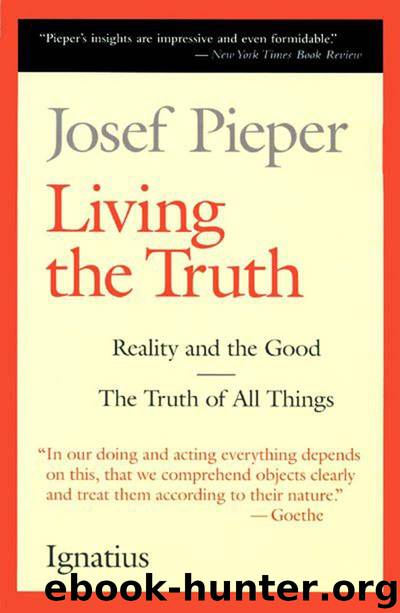Living the Truth by Josef Pieper

Author:Josef Pieper
Language: eng
Format: mobi, epub
Tags: Religion, Philosophy, Catholicism, Christianity
ISBN: 9780898702613
Publisher: Ignatius Press
Published: 2011-06-15T00:00:00+00:00
Chapter Two
The Identity of Mind and Reality
The same thing is expressed by another fundamental principle of the realist epistemology; it differs from the first one, which is more dynamic, in having a more static character. This second fundamental principle is expressed as follows: in knowledge the intellect and the known reality become one;1 “the intellect is wholly—that is, in a perfect manner, the known object”;2 “the soul becomes, so to speak, transformed into the real object”;3 the act of knowledge brings about identity between the mind and reality.4
The statements we have quoted, all of which are taken from the work of Saint Thomas Aquinas, have become so strange to us that we consider it quite self-evident that they are meant to be taken only in a figurative way. Even many a Thomist takes refuge in vague limitations and restrictions, maintaining that of course there is no question of a “real” and “actual” identity here. The “naive” epistemology of the Middle Ages seems to us moderns, if not absurd, at least excessively and unduly simplified, and we indulge in the consideration that between Saint Thomas and ourselves there intervenes the Critique of Pure Reason. But we must not forget that even the mature Goethe, who like ourselves belongs to the post-Kantian age, said that what we express about objects constitutes “the real objects in our conception”.5 A few years before his death (1829), he wrote in his Maxims and Reflections: “There is a delicate empiricism which identifies itself intimately with the object and thereby becomes an actual experience.”6
The identity between the intellect and the object, a true and actual self-sameness, is brought about by the immaterial, spiritual image of reality which impresses itself upon the intellect, as the seal impresses itself upon the wax. “The intellect is the known reality through the intelligible image of the reality.”7 In the image, the supermaterial core of “what-ness” of the real, formed by the creative intellect and adapted to cognition on the part of the created intellect, presents itself. It is the proper task of the spontaneous power of our mind (called intellectus agens by Saint Thomas8), which shares in and resembles the original divine spontaneity, to free this supermaterial core of “what-ness” in the real object from its material limitations. And in this illumination of sense data by the intellectus agens, the essentially spiritual cognition, accessible only to the immaterial “what-ness”, is prepared and made possible, as the reality is raised to the state of immediate knowability.
The intelligible image, then, is on the one hand a representation of reality; indeed, in the “what” it is identical with the objective reality. “The intelligible image is in a certain sense the essence and nature of the reality itself, not according to natural being, but according to intelligible being.”9 But “natural being” and “intelligible being” are two ways of being, so to speak, of the same reality. They are related to each other as are the concepts “true” and “being”; and truth, if the term is
Download
This site does not store any files on its server. We only index and link to content provided by other sites. Please contact the content providers to delete copyright contents if any and email us, we'll remove relevant links or contents immediately.
Resisting Happiness by Matthew Kelly(3341)
The Social Psychology of Inequality by Unknown(3031)
Day by Elie Wiesel(2783)
Designing Your Life by Bill Burnett(2746)
The Giving Tree by Shel Silverstein(2344)
Human Design by Chetan Parkyn(2072)
The Supreme Gift by Paulo Coelho(1978)
Angels of God: The Bible, the Church and the Heavenly Hosts by Mike Aquilina(1969)
Jesus of Nazareth by Joseph Ratzinger(1811)
Hostage to the Devil by Malachi Martin(1803)
Augustine: Conversions to Confessions by Robin Lane Fox(1772)
7 Secrets of Divine Mercy by Vinny Flynn(1746)
Dark Mysteries of the Vatican by H. Paul Jeffers(1723)
The Vatican Pimpernel by Brian Fleming(1702)
St. Thomas Aquinas by G. K. Chesterton(1634)
Saints & Angels by Doreen Virtue(1605)
The Ratline by Philippe Sands(1579)
My Daily Catholic Bible, NABRE by Thigpen Edited by Dr. Paul(1503)
Called to Life by Jacques Philippe(1481)
